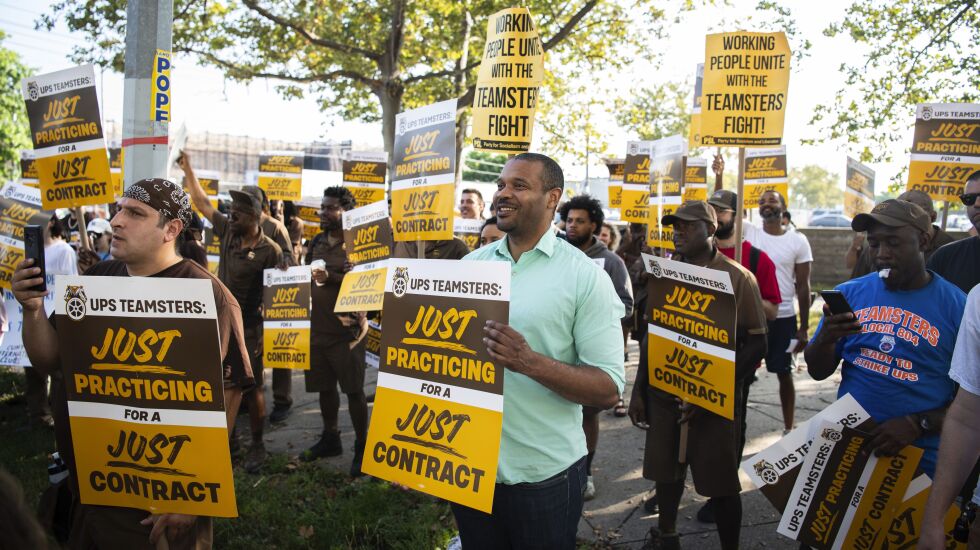
It’s crunch time for United Parcel Service and the International Brotherhood of Teamsters union after labor talks stalled Wednesday, with both sides accusing the other of abandoning negotiations.
The bargaining breakdown means a potential strike at the end of the month that could threaten the U.S. economy. The only strike in the company’s history lasted 15 days in 1997, and it cost UPS dearly.
The Teamsters represent 340,000 UPS workers nationally and about 15,000 in the Chicago area. Within the private sector, it is the largest unionized worker base in the U.S. Members authorized a strike last month and have said they will not work past their contract expiration on July 31.
UPS said it made a “historic offer that builds on our industry-leading pay.” The Teamsters said the Atlanta-based company quit bargaining after making an inadequate proposal. Neither side divulged details.
While lobbing accusations at each other about who quit negotiations, both sides have attested to the strength and fairness of their latest offers for a new contract. UPS and the Teamsters have made substantial progress with tentative agreements on noneconomic matters such as scheduling and equipment improvements. The momentum and other factors mean both sides have incentives to get back to the table.
Meanwhile, in the words of one observer, “There’s a lot of theater going on.”
In an interview Thursday on CNN, Teamsters General President Sean O’Brien offered an account the company did not dispute. He said a deal was in sight early Wednesday until UPS didn’t adequately improve part-timers’ wages.
“Part-time poverty doesn’t work for us in the Teamsters anymore so we’re fighting hard to take care of the part-timers and UPS said, ‘We don’t have any more to give’ and that was it,” O’Brien said. He said any strike would be a “self-inflicted wound” on UPS.
Supply chain hiccups
As the world’s leading package delivery company, UPS estimates that it touches 6% of the nation’s gross domestic product. A strike would be a major disruption for businesses.
DePaul University professor and transportation analyst Joseph Schwieterman said UPS and its competitors have been dealing with labor shortages that worsened with the pandemic.
“UPS’ work is so labor-intensive that they couldn’t keep their core systems running” if there’s a strike, he said.
The business-to-business shipping market, particularly for manufacturers and services such as auto repair, could be hit hard, he said. Schwieterman said FedEx and the U.S. Postal Service would see greater demand but could not take up the entire UPS load.
Big retail chains will have to reconfigure supply lines, but most have had practice doing that during the pandemic, said Jessica Dankert, vice president of supply chain at the Retail Industry Leaders Association. The group represents large national chains such as Target, Home Depot and Walgreens.
While retailers hope for a settlement, many have devised ways to bypass UPS, she said. Dankert said options include technology-enabled freight brokers, some of which have expanded in Chicago, to connect companies with trucks that have available space.
“More options are available now than there were five years ago,” she said.
Contract details
UPS has a complicated situation with some locals that have overlapping contracts with their own noneconomic terms. In the Chicago area, that includes locals 705 and 710, which reached tentative deals on noneconomics in the last few days.
Leaders of the locals did not return messages seeking comment and few details have been released. On Twitter, the Teamsters international unit mentioned both locals’ deals and praised 705 for improving conditions for UPS workers at O’Hare Airport.
UPS said it has 13 locations in the Chicago area.
For the national contract, both sides have agreed to scrap a two-tier wage system for drivers who work weekends and earn less money, a major sticking point.
Last month, the union and the company reached another tentative agreement to equip more trucks with air conditioning equipment. UPS said it would add air conditioning to U.S. small delivery vehicles purchased after January 1, 2024. Existing vehicles wouldn’t get that upgrade, but the union said they will have other additions such as two fans and air vents.
The union also won Martin Luther King Jr. Day as a full holiday and ended unwanted overtime on drivers’ days off.
UPS said its success has benefited the Teamsters because its membership at the company has more than tripled in 25 years. O’Brien has responded that the company favors Wall Street over Main Street.
Annual profits at UPS in the past two years are close to three times what they were pre-pandemic. The company returned about $8.6 billion to shareholders in the form of dividends and stock buybacks in 2022, and forecasts another $8.4 billion for shareholders this year.
UPS said that on average, its tractor-trailer drivers earn $112,000 a year and its package delivery drivers make $95,000 a year, in both cases with another $50,000 a year in pension and other benefits.
The company said part-timers earn an average of $20 an hour nationally, with some attendance incentives bringing pay to $23 an hour.
Contributing: Associated Press







